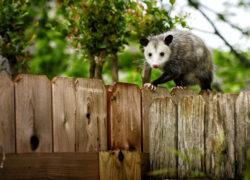
Even though wildlife creatures tend to invade homes in the wintertime, that doesn’t mean they go away during the summer months. Wildlife is still active during the summer, making it essential to continue placing wildlife preventative measures even as the weather gets warmer. Check out Florida’s top summer wildlife creatures to look out for and tips on how you can prevent them.
Raccoons
During the summer months, raccoons will give birth to their young, making them especially active. These creatures prefer to live in wooded areas with access to trees, water, and vegetation. Raccoons are dexterous and capable of opening doors, latches, and jars. These creatures will often habitat our attics, barns, and sheds. Since raccoons are nocturnal, they will search for food at night which includes fruit, nuts, seeds, fish, and even snakes. While searching for a food source, they will often destroy our property in the process. These creatures are known to tip over garbage cans and destroy our gardens!
Opossums
While caring for their young during the summer months, opossums actively hunt for a food source. These creatures are nocturnal and will look for food overnight. Some see them as beneficial as they will eat harmful and unwanted pests such as slugs, spiders, cockroaches, rats, mice, and more! They can become a nuisance to your home when searching for other food, such as nuts, fruit, and garbage, often knocking over garbage cans.
Snakes
More active in the summer months, these creatures are cold-blooded animals that require heat and sunlight for energy. If they receive too much heat exposure they can overheat, often looking for shelter to cool down. You can often find them in cool, dark places, including underneath rocks, decks, or basements. These creatures will usually look for a habitat that provides them with a food source, shelter, and shade.
Rats
Rats are active year-round, but summer provides them with more food sources. Excellent climbers, these creatures will adapt to human environments and can often be found in our attics, basements, and crawlspaces. Rats typically enter homes to find food sources such as grains, seeds, nuts, fruits, and vegetables. These creatures can be harmful to humans as they are known to contaminate food, cause fire hazards by chewing wires, and leave their droppings.
- To prevent these wildlife creatures, consider these prevention tips:
- Seal gaps or holes found in garages, windows, or exterior doors.
- Keep garbage stored in tightly sealed trash containers
- Remove any outdoor food sources, bring inside your pet food bowls at night
- Trim tree branches and shrubs away from your home
- Contact a professional pest control company to access your wildlife issue, provide you with a treatment plan, and recommended prevention options.



